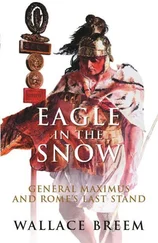Quintus said, “Come over the river when you have time. Then watch my cavalry.”
In the distance, like a thin smudge of charcoal against the evening sky, I could see the Taunus, the great mountain range that had once marked the extent of our eastern frontier. “That is where I want to go,” I said suddenly. “Will you take us?”
We stayed a day in his house and then, with his men guiding us and he riding on my left side, set out along the road that led to the abandoned Limes. I was intensely curious to see them, and so was Quintus. We might never have the chance again. After a time the road, whose surface grew worse with each mile, vanished suddenly and there was nothing ahead but green turf and tangled undergrowth. “They tore it up,” said the Frank. He turned to me, his face serious. “You do not know how they hate Rome.”
“Why?” I asked.
“There are many reasons: the loss of freedom, the heavy taxes, the injustice of your laws, the cruelty of your military conscription. Even your towns, with their houses and their straight roads, seem like prisons to men who hunt in the forest and whose women cook by an open fire.” I glanced at Quintus and shook my head slightly. This was not a time for argument.
The sky clouded over, it grew dark and the rain began to fall in great splashing drops that soaked the breeches I was wearing and made wet patches on my knees and shoulders. The horses plodded on, squelching through the mud and we had to duck our heads to avoid being scratched by the branches that barred our way. We saw few people; a hut or two in a clearing, occupied by a sullen farmer and his wife, who watched us suspiciously as we passed, but that was all. The forests were full of game. Twice I saw bears, playing in the watery sunlight with their cubs; once a great boar lumbered across our path, stopped to grunt at us with red eyes, and then trotted off into the scrub. And at night we could hear the wolves, howling in the darkness around the camp. It was then that I remembered Varus and his three legions and was sorry that I had come. All the time we were climbing upwards towards a forest ridge that showed itself upon the horizon whenever we came to a clear space between the trees.
On the fourth day we came out of the woods into a great clearing that seemed to extend for miles to the right and left of us. It was as though the blade of a giant sword, red hot from the furnace, had been placed on the forest and burned a great cut along its length. The clearing was nearly a thousand yards wide in places. In front of us ran a road, half covered now with weeds and dirt. Beyond it, a quarter of a mile distant, stood a square stone watch-tower with a smashed roof and a broken balcony. We rode up to it and dismounted, while our squadron spread out and posted sentries in a half circle. Slowly we walked up to the tower through a litter of fallen tiles. In front of it, facing north, half filled in now by the action of wind and rain were the remnants of the great ditch. But the great mound of earth that had been flung up behind it still remained. Not even time could destroy that. On the further side were the fragmentary remains of the palisade. Much of the timber had been pulled out to be used for other purposes, but here and there, a section still stood in its entirety, mute evidence of the slackened power of that empire—my empire—which now fought only on the defensive.
The entrance to the tower was ten feet above the ground, and in the old days the garrison had used a ladder which they then pulled up after them. One of the legionaries made a rough climbing pole out of a loose piece of timber and said, with a grin, “Will that do, sir?” I nodded. I took off my helmet and climbed, entering the gap where the door had once been. Inside was dust and darkness. I found the original ladder that led from one level to the next and mounted it cautiously till I came out onto the balcony at the top. It was raining slightly and there was a cold wind blowing from the north. Scratched on the walls I saw names—the names of men, now dead, and long forgotten; men whose names told me clearly that they had come from Moesia, from Apulia, from Pannonia, and from such far distant provinces as Mauretania and Aegyptus, the southern rim of the empire. Carved with greater care I read the name of the legions from which the men came who had once guarded this section of the frontier. I screwed up my eyes. “Legio IV Macedonica,” I said, peering at the faint scratches on the stone.
“What, in the name of the gods, happened to them, I wonder?” said Quintus softly. “I never heard their number in my life.”
“Perhaps someone will say the same of us,” I said grimly. “They were raised by Caesar and fought with Marcus Antoninus in Macedonia, but deserted to Octavius before Philippi.” I peered again. “Here are some more. Leg. XXII Prim. They were here at the death of Nero. But both they and the Fourth were annihilated in one of the Aleman wars of the last century. Now this looks like Leg. XIV Gemina. They were posted to Moguntiacum by Augustus. Asprenas brought them back to Vetera after the Varian disaster. They came back again, after going into Britannia with Aulius Plautius. They’re in Pannonia now.”
Quintus scrabbled at the stone work. “Can you read this? It’s the Thirtieth, I think. Only the last ten is missing.”
“Yes, look at the emblem. They were raised by Domitian and were still here in the time of Hadrian. A detachment fought alongside us in Italia. Do you remember? By the gods, that seems a long time ago.”
Marcomir said, “It is a place of ghosts.”
“It was not defended to the end,” I said. “It was just abandoned.”
“That was in the time of Gallienus,” said Quintus. “My father told me about it. The cohorts were in forts, seven miles apart, with these posts every half mile in between.”
“And now—nothing.”
We descended the ladders and walked back to where our horses cropped the grass. I looked at the clearing and at the mound of earth, stretching away into the distance. I said, “Once, you could walk along that under the protection of Roman spears. And if you walked far enough you would travel through eight provinces until you reached Scythia and a great sea.”
Quintus said, “I should like to have done that. It would have been a fine thing to walk across the roof of the empire.”
We looked at each other and there was the same thought in both our minds.
Marcomir said, “Then, you were the lords of the world. But now. . . .” He did not end the sentence. He did not need to.
At the edge of the clearing I turned to look back but the square tower was almost hidden now by the driving rain. It was as though even the gods had pity enough to weep for our fallen greatness.
A mile from Moguntiacum we reached the furthest of the out-posts that I had stationed on the east bank. When I had finished inspecting the men and their weapons I spoke privately to the optio in charge. “What is the matter?” I said. “You look as though you had seen a ghost.”
He said, his face tense beneath its leathery tan, “I will show you, general. I have already sent a message across the river.”
We walked as he directed. Two hundred yards from the post I could see an object standing above the ground. As we came closer I could see what it was: the decapitated head of a horse, fixed upon a pole. I looked at the dried blood upon the nostrils, the human hand held between the yellowed teeth and the glazed eyes that crawled with flies. “What does it mean?”
Marcomir said, “It is the common way to insult an enemy in these parts. You may expect trouble from now on. I will warn my people.”
Two nights later I was woken by a disturbance and the camp guard commander was at my door, reporting that a small boat had been seen close to the shore, north of the town. The two men in it had been killed with javelins but the guards’ efforts to catch the boat had failed. It had drifted downstream in the darkness.
Читать дальше












